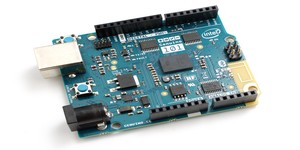
Intel has announced the first commercial product to use its low-power Quark CPU: the Arduino-compatible Galileo development board, due to launch later this year.
Part of Intel's growing focus on the ultra-low power embedded market, where it is a minnow compared to the likes of ARM, Texas Instruments and Atmel, the Quark is a system-on-chip design which Intel claims can act as both microcontroller and microprocessor in embedded systems. While drawing a tiny amount of power, the chip offers full x86 compatibility - roughly equivalent to an original Pentium in terms of instruction set - and is capable of running a fully-fledged operating system like Linux.
The first commercial use of Quark is to be Galileo, a development board designed for the maker community. The board is pin-compatible with Arduino shields designed for the Uno Revision 3 running at either 3.3V or 5V. It includes 14 digital input/output pins, six of which feature pulse width modulation (PWM) control, six analogue inputs through an external AD7298 analogue-to-digital converter chip, I²C and two-wire interface (TWI) support, serial peripheral interface (SPI) running at up to 25MHz, UART - in short, all the features of an Arduino Uno.
Where the Galileo differs from the Arduino Uno on which it is based is its processor: rather than a somewhat limited Atmel microcontroller, the Galileo is powered by a 32-bit single-core Quark chip running at 400MHz with 512KB of on-die SRAM. Thanks to this chip, the board also has some very tempting extras: a 10/100 Ethernet connector, a PCI Express 2.0 mini-card slot, a USB 2.0 host connector, a 10-pin JTAG header for debugging, 256MB of RAM and an 8MB legacy SPI flash area for program storage which can be expanded using a USB Mass Storage device or micro-SD card.
Impressively, the Galileo is truly Arduino compatible: the board can be programmed directly from the latest version of the Arduino IDE software just as any other Arduino board. A pre-loaded Linux operating system sits in the 8MB flash storage - similar to the new MIPS-based Arduino Yún.
UK pricing for the Intel Galileo has yet to be confirmed, with US pricing predicted to be under $60 - a cost that makes it extremely competitive compared to a traditional Arduino Uno with optional Ethernet shield. More details are available on the Arduino website.
Part of Intel's growing focus on the ultra-low power embedded market, where it is a minnow compared to the likes of ARM, Texas Instruments and Atmel, the Quark is a system-on-chip design which Intel claims can act as both microcontroller and microprocessor in embedded systems. While drawing a tiny amount of power, the chip offers full x86 compatibility - roughly equivalent to an original Pentium in terms of instruction set - and is capable of running a fully-fledged operating system like Linux.
The first commercial use of Quark is to be Galileo, a development board designed for the maker community. The board is pin-compatible with Arduino shields designed for the Uno Revision 3 running at either 3.3V or 5V. It includes 14 digital input/output pins, six of which feature pulse width modulation (PWM) control, six analogue inputs through an external AD7298 analogue-to-digital converter chip, I²C and two-wire interface (TWI) support, serial peripheral interface (SPI) running at up to 25MHz, UART - in short, all the features of an Arduino Uno.
Where the Galileo differs from the Arduino Uno on which it is based is its processor: rather than a somewhat limited Atmel microcontroller, the Galileo is powered by a 32-bit single-core Quark chip running at 400MHz with 512KB of on-die SRAM. Thanks to this chip, the board also has some very tempting extras: a 10/100 Ethernet connector, a PCI Express 2.0 mini-card slot, a USB 2.0 host connector, a 10-pin JTAG header for debugging, 256MB of RAM and an 8MB legacy SPI flash area for program storage which can be expanded using a USB Mass Storage device or micro-SD card.
Impressively, the Galileo is truly Arduino compatible: the board can be programmed directly from the latest version of the Arduino IDE software just as any other Arduino board. A pre-loaded Linux operating system sits in the 8MB flash storage - similar to the new MIPS-based Arduino Yún.
UK pricing for the Intel Galileo has yet to be confirmed, with US pricing predicted to be under $60 - a cost that makes it extremely competitive compared to a traditional Arduino Uno with optional Ethernet shield. More details are available on the Arduino website.

MSI MPG Velox 100R Chassis Review
October 14 2021 | 15:04








Want to comment? Please log in.